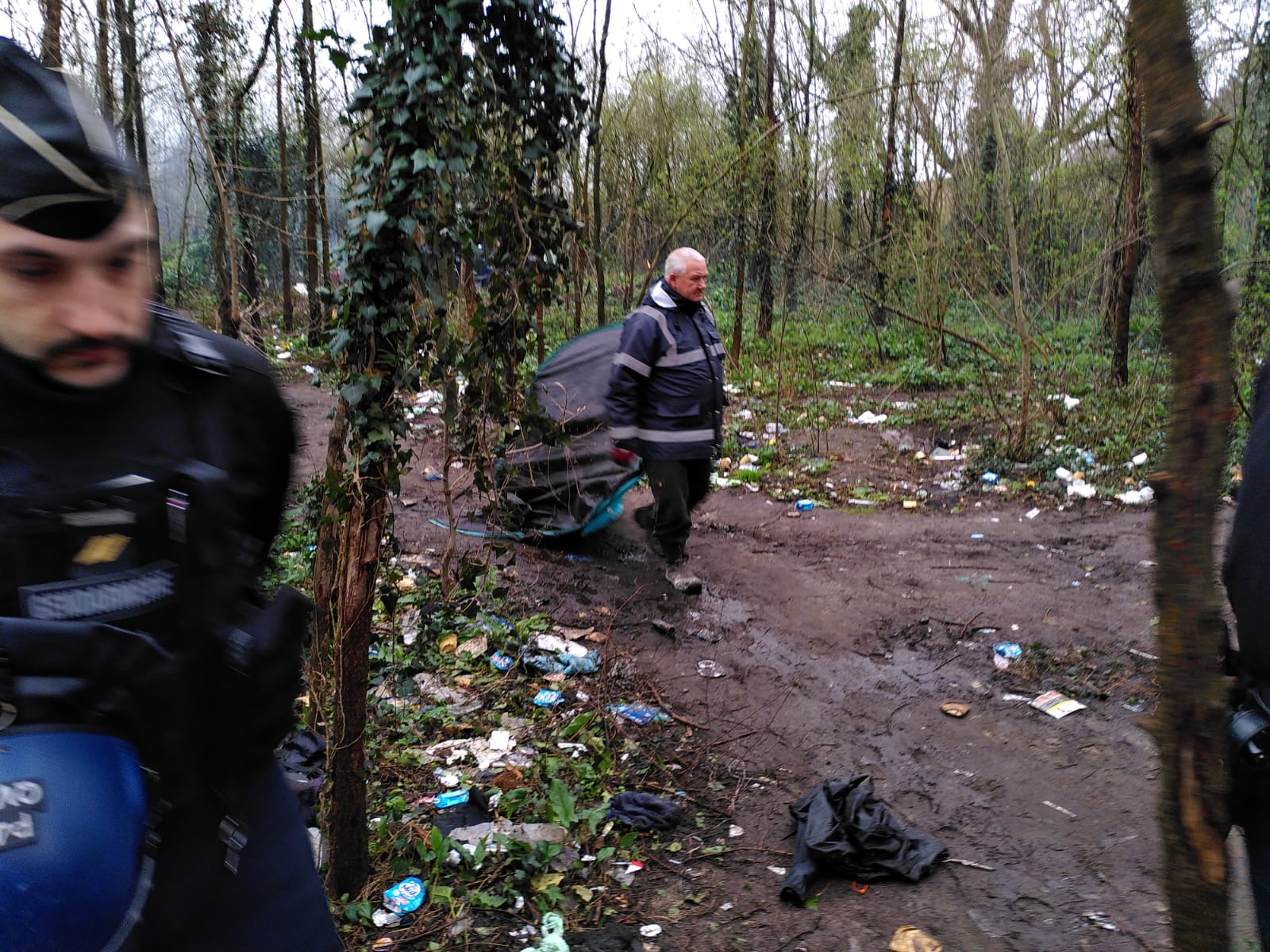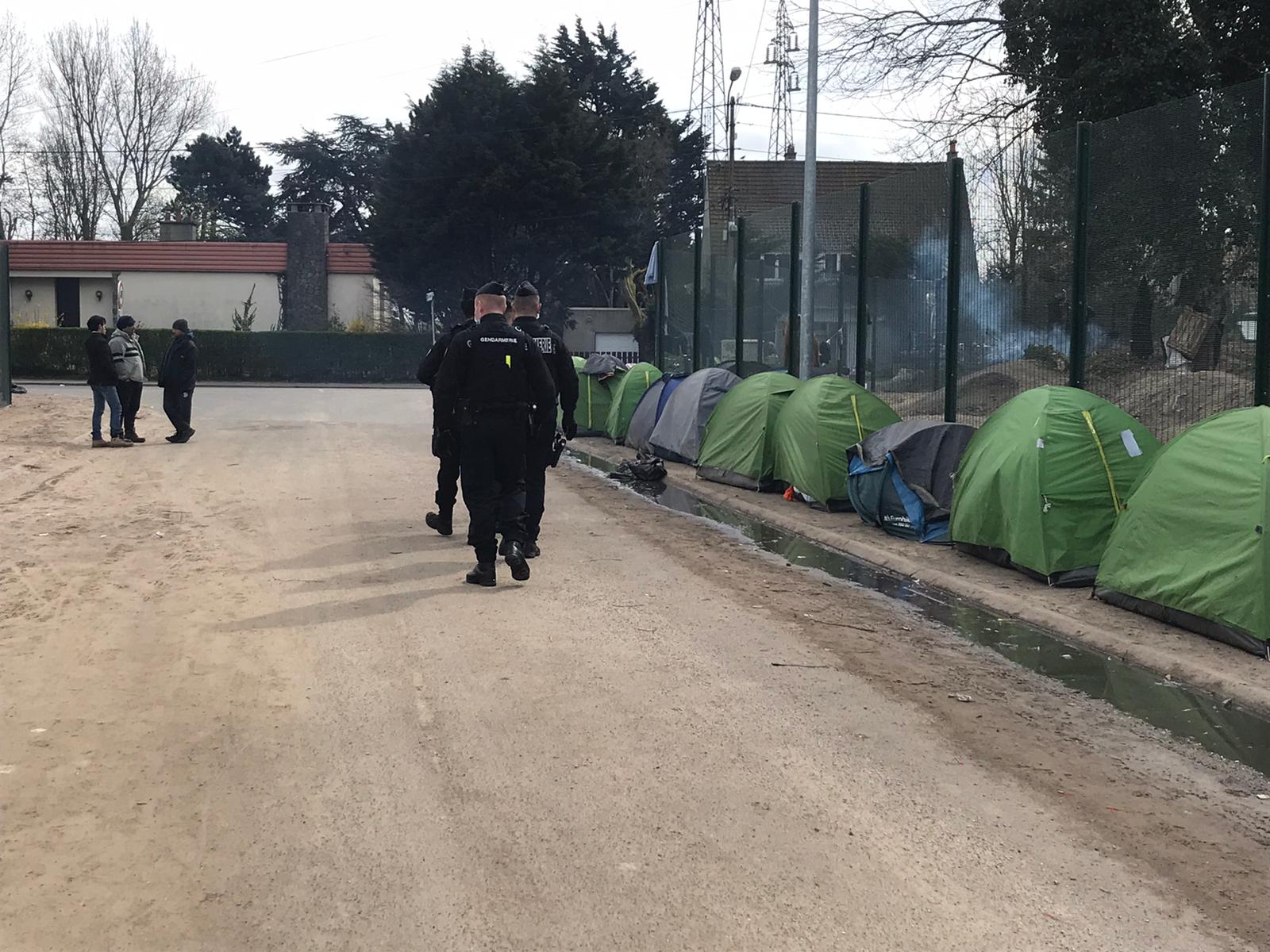Calais refugees taking more risks to cross to UK as police continue with ‘cruel’ evictions during pandemic
‘People think the only option of getting away from that hellhole is taking a risk on a boat,’ one aid worker says. ‘We’ve seen life jackets being made out of empty water bottles. That’s when you see kids die trying to cross.’ May Bulman and Zoe Tidman report


Migrants in northern France are taking increasingly dangerous risks to reach the UK as police carry out “cruel” and “ineffective” evictions of makeshift camps in the region despite the country’s lockdown, charities have warned.
Police have continued destroying people’s tents and taking away the few possessions they have to discourage them from settling in camps in Calais. This is said to be exacerbating the suffering caused by reduced access to support during the pandemic.
Aid workers say there have been five confirmed cases of coronavirus so far across refugee settlements in Calais and Grande-Synthe, an area outside the city of Dunkirk. New people arrive every day and conditions grow increasingly unsanitary, raising fears of a widespread outbreak.
The situation is said to be causing mounting desperation to reach the UK. A total of 145 migrants reached British shores on Friday – including 51 packed on a single inflatable boat – which is believed to be a single-day record, prompting concerns about the heightened risks people are taking.
“People are seeing the only option of getting away from that hellhole as taking a risk on a boat,” Josh Hallam, field manager at Help Refugees, told The Independent.
“We’ve seen life jackets being made out of empty water bottles. Rather than staying when all this is going on, they’re deciding to gamble. That’s when you see kids die trying to cross.”
There are around 1,100 people in Calais, including around 150 unaccompanied minors. In Grande-Synthe, there are 400 to 500 people, including 29 families with children.
More than 140 evictions have taken place since the start of the French lockdown in mid-March in Calais, according to Human Rights Observers, an organisation documenting the situation in northern France.
“It is the most nonsensical thing,” said Clare Moseley from the charity Care4Calais. “There is a travel ban in France so the refugees couldn’t even leave if they wanted to. What on earth is the point in evicting somebody who cannot leave? It is the most pointless exercise, and the pointlessness of it makes it cruel.”
Ms Moseley said police were going into settlements around every two days to make people move their tents. If migrants are away from their tents, she added, they could be destroyed and possessions removed.
Antonie Nehr, a coordinator at Utopia56, an organisation helping displaced people across France, said authorities had been carrying on with the same “ineffective” approach they had used for years.
“It is a hostile policy with a clear message: you aren’t welcome here,” he said, adding that there are evictions every day in Calais, with each camp dismantled every other day.
“During the health crisis when this approach should be changed, they are keeping it up. They continue to break up the camp, they continue to have violent police. It is hard to get your head around the fact they are still doing this approach during this time of a health crisis.”

Concerns have also been raised by French police over their own safety while carrying out the evictions. In a letter to the interior minister in March, police union Synergie-Officiers said it was “irresponsible” not to suspend evictions during the pandemic – but the operations continued.
Aid workers and displaced people meanwhile complain of increased violence and hostility by officers. Last week, five Eritrean refugees sleeping rough in Calais submitted a formal complaint to French riot police over their “impulsive and aggressive” actions towards them.
“They don’t see us as human beings,” they said in the letter. “They insult us with names such as monkey, bitch, etc. And in the past few weeks, they have started to threaten our lives by beating us as soon as the opportunity arises.”
There has been a significant spike in arrests of migrants in France this year, with 1,100 arrested in the first quarter of 2020 compared with 342 arrests in the same period last year.
Police are also said to have fined 26 volunteers for breaching French lockdown rules – where people have been told to stay at home unless it is essential – while helping migrants at the camps amid the virus outbreak. Separately, four volunteers observing an eviction on 24 April were reportedly arrested and detained for 10 hours.
The French authorities say they have offered shelter to migrants in the area, with buses arriving at the camps on a number of occasions to transport people to accommodation centres.
But charities said their efforts had been “toothless” due to the lack of communication about the offer. Reports reveal that, in many centres, the conditions are cramped and people have to share rooms, in breach of social distancing measures.
Around 323 displaced people have so far gone to accommodation centres on a voluntary basis – but 82 people have already left and returned to the camps, according to Help Refugees.
Mr Hallam said that 17 riot police vans were present at a recent “accommodation operation”, whereby state-contracted organisations encourage people to board buses to go to shelters.
“There’s no information about where the buses are going, it’s very much just get on the bus,” he said. “A lot of people are already scared of engaging with the authorities. There’s more that can be done to try to win back that trust and keep people safe. A bunch of riot police vans isn’t how to do it.”
Those who remain in the camps face increasingly challenging circumstances, as accessing food and healthcare becomes more difficult. Fewer grassroots charities are able to operate.
Medecins du Monde and the Red Cross are carrying out medical patrols twice a week in Calais to find people with potential symptoms of Covid-19, and those with symptoms are referred to state healthcare for further tests.
However, aid workers said that if people fall ill when the NGOs are not patrolling, accessing healthcare is a significant challenge, as organisations that had previously transported people to the hospital are no longer operating. There have also been numerous testimonies from displaced people in Calais stating that public buses that go to the hospital have not been stopping for them.
Mr Hallam added: “People are still arriving every day, so there’s a big possibility that it’s going to become something worse. It’s already difficult under precaution with a few cases. If there’s a full-blown outbreak, we’ll have grassroots volunteers doing jobs that need to be done by governments with enormous resources.
“Homeless people aren’t being treated like this. The exceptionalism that both the UK and the French have towards Calais is mind-blowing. Even when it’s something so serious that it can affect both of those nations’ public health, it’s still business as usual.”
The local authorities of Calais and Dunkirk have been approached for comment.
The UK’s minister for immigration compliance and the courts, Chris Philp, said: “The recent increase in crossings is totally unacceptable, which is why we are stepping up action to stop the crossings, going after the criminals perpetrating these heinous crimes and prosecuting them for their criminal activity.”
Join our commenting forum
Join thought-provoking conversations, follow other Independent readers and see their replies
Comments